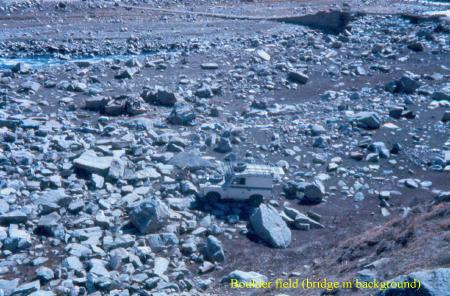
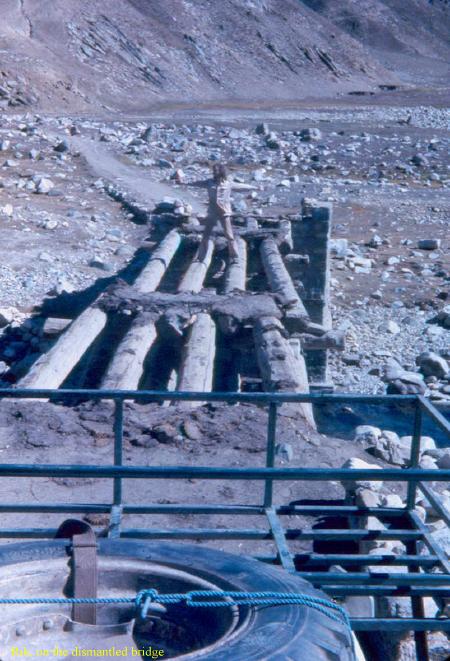
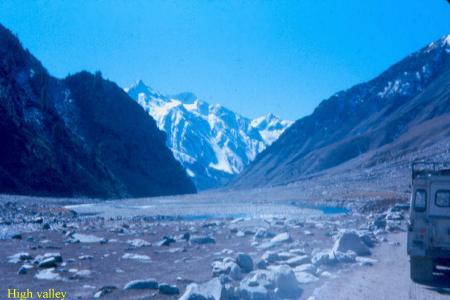

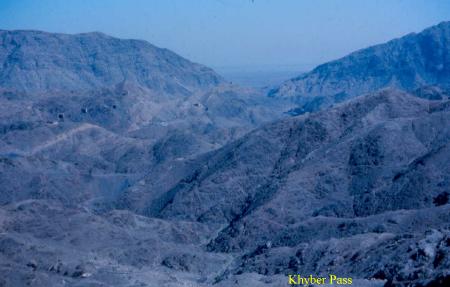 Then began the road over the Khyber. It is metalled all the way, and there are frequent signs of an
unmetalled old road (to which animal traffic is routed); even wilder! The road climbs in a series of wild
hairpin bends up the mountainside; local lorries go up packed solid with passengers.
Then began the road over the Khyber. It is metalled all the way, and there are frequent signs of an
unmetalled old road (to which animal traffic is routed); even wilder! The road climbs in a series of wild
hairpin bends up the mountainside; local lorries go up packed solid with passengers.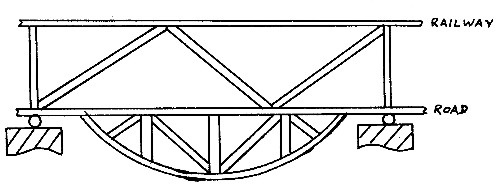
| Sten SMG | Rs700 |
| English-made .303 SMLE | Rs1500 (excellent condition) |
| "Broomhandle" Mauser | Rs4000 (a collectors' item) |
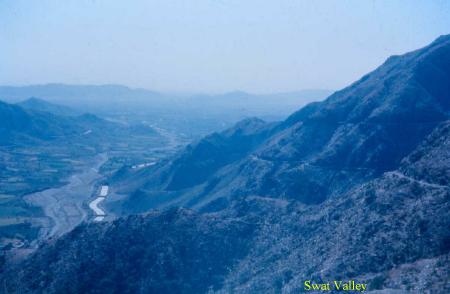 We went elsewhere to eat (but the same type of food), and just got a meal before the first eating-period (it
is still Ramazan) ended. The Shahin Hotel has an enclosed courtyard, where they served tea "after hours". The
room (for 4, at Rs10) is of similar standard to the National Hotel in Peshawar.
The Shahin is basically a transport-drivers' rest-house, so plenty of road tips can be picked up. (Here, on
the single-track mountain roads, lorry drivers are far more courteous than elsewhere; however they frequently
appear to drive at night with no lights at all!) The area known as Kafiristan (mentioned by Omar Burke in his
book "Among the Dervishes") is reportedly north of Chitral (it was later checked to be south-east!) [The
first information was correct, not the second.] There is a motorable road to Hunza, both direct from the
South, and from Swat. The Chinese have a team of 60,000 (we double-checked the figure) engineers in the North,
building the "Karakoram Highway" from Gilgit clear through to Tibet, 4 lanes wide!
Some of these drivers regularly make the run into China, but as part of military convoys, which obviously
is not open to foreigners.
We are strongly advised not to camp out at night here: as night fell, the gates of the courtyard were closed
and barred, and a guard with a shotgun sat just inside the gate! It looked as though they were securing a
fortress.
The road east to Srinagar is apparently passable; we all feel like trying for it.
We were also given some Hunzakuts sweets; dried apricots stuffed with nuts. Mmmm! Apparently they are only
available in the Hunza/Gilgit area, these were brought back by one of the lorry drivers.
The plan, then, is as follows. Keith and Rik want to stop and rest somewhere, away from the crowds in
Peshawar; while Brian and I want to see some of the country towards Chitral. Also, Shadowfax' steering is
a little suspect. Hence Keith and Brian are to swap places, and Shadowfax will stop early today. Brian and
I will continue, and sleep somewhere up the road tonight, rejoining the others tomorrow, so enabling us to
return to Peshawar on Wednesday afternoon, in time for Eid.
After Eid, we go to 'Pindi to clear our financial business, before leaving for India, if possible via
Srinagar.
We went elsewhere to eat (but the same type of food), and just got a meal before the first eating-period (it
is still Ramazan) ended. The Shahin Hotel has an enclosed courtyard, where they served tea "after hours". The
room (for 4, at Rs10) is of similar standard to the National Hotel in Peshawar.
The Shahin is basically a transport-drivers' rest-house, so plenty of road tips can be picked up. (Here, on
the single-track mountain roads, lorry drivers are far more courteous than elsewhere; however they frequently
appear to drive at night with no lights at all!) The area known as Kafiristan (mentioned by Omar Burke in his
book "Among the Dervishes") is reportedly north of Chitral (it was later checked to be south-east!) [The
first information was correct, not the second.] There is a motorable road to Hunza, both direct from the
South, and from Swat. The Chinese have a team of 60,000 (we double-checked the figure) engineers in the North,
building the "Karakoram Highway" from Gilgit clear through to Tibet, 4 lanes wide!
Some of these drivers regularly make the run into China, but as part of military convoys, which obviously
is not open to foreigners.
We are strongly advised not to camp out at night here: as night fell, the gates of the courtyard were closed
and barred, and a guard with a shotgun sat just inside the gate! It looked as though they were securing a
fortress.
The road east to Srinagar is apparently passable; we all feel like trying for it.
We were also given some Hunzakuts sweets; dried apricots stuffed with nuts. Mmmm! Apparently they are only
available in the Hunza/Gilgit area, these were brought back by one of the lorry drivers.
The plan, then, is as follows. Keith and Rik want to stop and rest somewhere, away from the crowds in
Peshawar; while Brian and I want to see some of the country towards Chitral. Also, Shadowfax' steering is
a little suspect. Hence Keith and Brian are to swap places, and Shadowfax will stop early today. Brian and
I will continue, and sleep somewhere up the road tonight, rejoining the others tomorrow, so enabling us to
return to Peshawar on Wednesday afternoon, in time for Eid.
After Eid, we go to 'Pindi to clear our financial business, before leaving for India, if possible via
Srinagar.
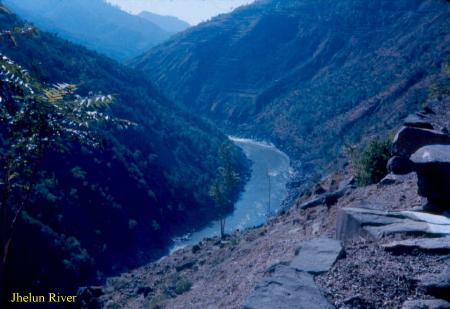 About 1000E we reached the bridge over the Jhelun River, which is the official Pakistan/Kashmir border, and
crossed into occupied (or "Azad" - "Free", if you are a Pakistani!) Kashmir.
At this point, I break off until tomorrow, as the oil lamp I am using is running out of fuel!
About 1000E we reached the bridge over the Jhelun River, which is the official Pakistan/Kashmir border, and
crossed into occupied (or "Azad" - "Free", if you are a Pakistani!) Kashmir.
At this point, I break off until tomorrow, as the oil lamp I am using is running out of fuel!
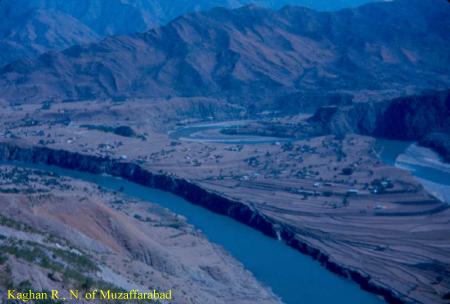 A hazard (doubtless seasonal) on all these roads is the frequent mule-trains carrying (we suppose) produce
to market. The lorry and bus-drivers in the hills are far more courteous than elsewhere, alas the minibus
and car-drivers are as bad as ever!
After the bridge leading out of Muzaffarabad, where we re-entered Pakistan (into Frontier province, having
left from Punjab), we were directed to turn right by a military patrol and set off along a crazily twisting
and climbing mountain road, in company with a plush Army Mercedes staff car. This proved to be going to a huge
Army exercise (an ambush demonstration) about 10 miles up the road. A few miles after this the road crosses a
dry river-bed, and forks. We erroneously took the left turn and drove through beautiful pine-forest hills,
into a valley leading to Mansehra, where we discovered our error, took tea, and turned around, returning to
the fork about 1530E.
A hazard (doubtless seasonal) on all these roads is the frequent mule-trains carrying (we suppose) produce
to market. The lorry and bus-drivers in the hills are far more courteous than elsewhere, alas the minibus
and car-drivers are as bad as ever!
After the bridge leading out of Muzaffarabad, where we re-entered Pakistan (into Frontier province, having
left from Punjab), we were directed to turn right by a military patrol and set off along a crazily twisting
and climbing mountain road, in company with a plush Army Mercedes staff car. This proved to be going to a huge
Army exercise (an ambush demonstration) about 10 miles up the road. A few miles after this the road crosses a
dry river-bed, and forks. We erroneously took the left turn and drove through beautiful pine-forest hills,
into a valley leading to Mansehra, where we discovered our error, took tea, and turned around, returning to
the fork about 1530E.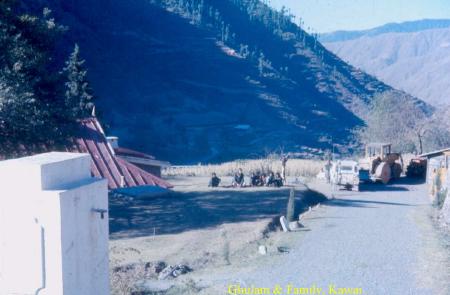 Another of these amazing Pakistanis, we talked at length during the evening, and he asked us to bring out
several items from England when we came again. As with Mohammad the schoolmaster, Ghulam asked about permits
to get to England. We may have disillusioned him a little with our talk of inflation and high prices, but
when Pakistani inflation has run at several thousand percent since Partition, the wish to escape is natural.
Another of these amazing Pakistanis, we talked at length during the evening, and he asked us to bring out
several items from England when we came again. As with Mohammad the schoolmaster, Ghulam asked about permits
to get to England. We may have disillusioned him a little with our talk of inflation and high prices, but
when Pakistani inflation has run at several thousand percent since Partition, the wish to escape is natural.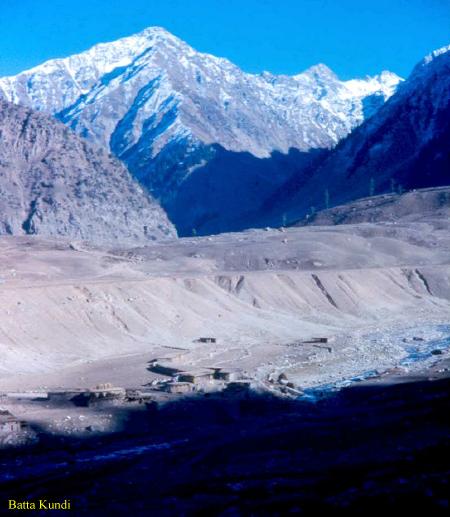 On reaching Batta Kundi, we crossed the river, by what was supposed to be the last good bridge. The road
leaves the Kaghan Valley here, and climbs over a salient to join a tributary valley to the west.
Eight miles from Batta Kundi, after crossing three allegedly broken bridges, all in perfect order, we reached
the I.B. at Burawai. The altitude here is 10009ft, according to the plaque at the I.B. gate, the bungalow
being at the roadside, in the middle of nowhere. We, finding no-one around, forced the padlock to gain entry;
shortly afterwards the manager arrived! He was very friendly, after we offered him one of our locks in
replacement. Rik tried to pass off a Czech currency receipt as an authority to stay free of charge in I.B.'s!
He wouldn't have it, but on payment of the correct Rs15 fee, helped me repair the damage (we had merely forced
the hasp-screws out of the wood), and for Rs5 extra, provided us food for supper. Viz., milk, potatoes, and
eggs, which we cooked on a wood fire (he also supplied the firewood). Afterwards, he provided fresh-baked
bread and hot çay. Considering that we had expected to spend the night hungry and either in Orodruin or an
abandoned cowshed, it was a jolly good Rs20 worth. We are definitely converts to I.B.'s!
I am now writing this, using Orodruin's searchlight focussed in through a window, as there is no light here
at all. The manager has a room in one of the adjoining buildings, which are well built wood and stone
structures, with tin roofs, but a timber ceiling to retain the heat.
Orodruin has performed well at high altitudes, the only fault being a slight tendency to stall, corrected by
use of the hand throttle.
The outside temperature is just about freezing; we are just below the snowline here, with some 4000 vertical
feet to gain to the pass. The scenery, both by sun- and moonlight, is amazing, snow-covered peaks all around,
but without a wideangle lens, there is little one can do in the way of photography.
On reaching Batta Kundi, we crossed the river, by what was supposed to be the last good bridge. The road
leaves the Kaghan Valley here, and climbs over a salient to join a tributary valley to the west.
Eight miles from Batta Kundi, after crossing three allegedly broken bridges, all in perfect order, we reached
the I.B. at Burawai. The altitude here is 10009ft, according to the plaque at the I.B. gate, the bungalow
being at the roadside, in the middle of nowhere. We, finding no-one around, forced the padlock to gain entry;
shortly afterwards the manager arrived! He was very friendly, after we offered him one of our locks in
replacement. Rik tried to pass off a Czech currency receipt as an authority to stay free of charge in I.B.'s!
He wouldn't have it, but on payment of the correct Rs15 fee, helped me repair the damage (we had merely forced
the hasp-screws out of the wood), and for Rs5 extra, provided us food for supper. Viz., milk, potatoes, and
eggs, which we cooked on a wood fire (he also supplied the firewood). Afterwards, he provided fresh-baked
bread and hot çay. Considering that we had expected to spend the night hungry and either in Orodruin or an
abandoned cowshed, it was a jolly good Rs20 worth. We are definitely converts to I.B.'s!
I am now writing this, using Orodruin's searchlight focussed in through a window, as there is no light here
at all. The manager has a room in one of the adjoining buildings, which are well built wood and stone
structures, with tin roofs, but a timber ceiling to retain the heat.
Orodruin has performed well at high altitudes, the only fault being a slight tendency to stall, corrected by
use of the hand throttle.
The outside temperature is just about freezing; we are just below the snowline here, with some 4000 vertical
feet to gain to the pass. The scenery, both by sun- and moonlight, is amazing, snow-covered peaks all around,
but without a wideangle lens, there is little one can do in the way of photography.
 |
 |
 |
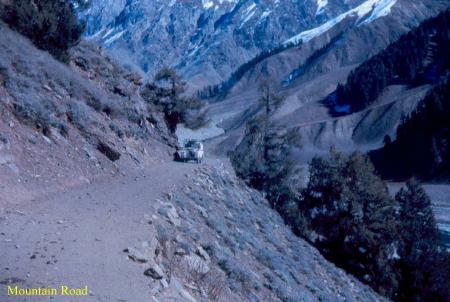 On reaching the first bridge again, we tried using the sand-ladders, doubled, to ease our way through the
stream, hoping to avoid using the winch. The ladders however, buckled, and we were left astride a large
boulder in midstream. The HiLift [aka "Kangaroo"] jack could have been used to good effect here (had it not also been left
in Charsadda!), since it was impossible to position a conventional jack in the stream.
In the event, rocks were piled in front of the rear wheels, to lift, and the winch was again used. There
were no further mishaps after this. We were both very impressed by the performance of the Iranian clamp-repair
on the winch cable; that winch was used in deadly earnest, but the clamp held firm. Spare clamps of this type,
for running repairs, would be a good idea.
We reached Naran about 1400E, took our first food and drink of the day, and went in search of Simon and Kate.
They were not there, but Anwar, the Government Transport Service officer here, made us welcome, and we
decided to stay the night here, rather than press on to Kawai, as originally planned.
Anwar and we discussed many things during the afternoon and evening, including his attitude to the Chinese
building the roads. He (rather naively, we thought) sees no threat in Communism, he believes that contact
with free peoples will convert the Chinese, rather than the reverse.
On reaching the first bridge again, we tried using the sand-ladders, doubled, to ease our way through the
stream, hoping to avoid using the winch. The ladders however, buckled, and we were left astride a large
boulder in midstream. The HiLift [aka "Kangaroo"] jack could have been used to good effect here (had it not also been left
in Charsadda!), since it was impossible to position a conventional jack in the stream.
In the event, rocks were piled in front of the rear wheels, to lift, and the winch was again used. There
were no further mishaps after this. We were both very impressed by the performance of the Iranian clamp-repair
on the winch cable; that winch was used in deadly earnest, but the clamp held firm. Spare clamps of this type,
for running repairs, would be a good idea.
We reached Naran about 1400E, took our first food and drink of the day, and went in search of Simon and Kate.
They were not there, but Anwar, the Government Transport Service officer here, made us welcome, and we
decided to stay the night here, rather than press on to Kawai, as originally planned.
Anwar and we discussed many things during the afternoon and evening, including his attitude to the Chinese
building the roads. He (rather naively, we thought) sees no threat in Communism, he believes that contact
with free peoples will convert the Chinese, rather than the reverse.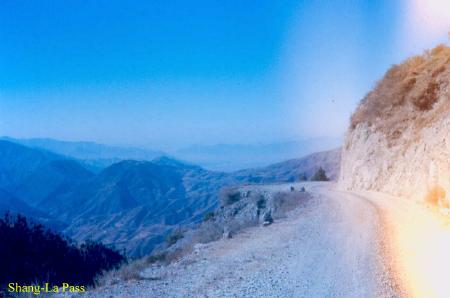 The road climbs to an unknown, but considerable, height at Shangla Pass, where there is a magnificent view
all around, before dropping precipitously to the Swat Valley. The road distance between the Indus and Swat
valleys (Besham - Khawzakhela) is 42 miles; a very hectic 2½ hours' driving by Rik.
At Khawzakhela, we decided to abandon the attack on the North (in principle, there are two more roads to
Gilgit, via Swat and via Chitral), as Orodruin has undoubtedly suffered some damage on Babusar. There is a
pronounced steering shake around 30mph, and a heavy "thunk" on changing gear. Further, we find nowhere to
change travellers' cheques; apparently only United Bank handles any foreign exchange at all, and often even
their branches in remote areas only accept cash.
Hence we turned south, stopping for lunch in Mangora. The road south was jammed with herds of cattle, etc.,
apparently heading for market in Batkhela. 24 miles after Mangora, we picked up the road we had taken a
fortnight before, on our abortive run up to Chitral. We stayed with this road to Dargai, just south of
Malakand Pass. Here, we tried for what looked on the map to be a short cut to Peshawar, bypassing Nowshera
and the G.T. Road.
The road climbs to an unknown, but considerable, height at Shangla Pass, where there is a magnificent view
all around, before dropping precipitously to the Swat Valley. The road distance between the Indus and Swat
valleys (Besham - Khawzakhela) is 42 miles; a very hectic 2½ hours' driving by Rik.
At Khawzakhela, we decided to abandon the attack on the North (in principle, there are two more roads to
Gilgit, via Swat and via Chitral), as Orodruin has undoubtedly suffered some damage on Babusar. There is a
pronounced steering shake around 30mph, and a heavy "thunk" on changing gear. Further, we find nowhere to
change travellers' cheques; apparently only United Bank handles any foreign exchange at all, and often even
their branches in remote areas only accept cash.
Hence we turned south, stopping for lunch in Mangora. The road south was jammed with herds of cattle, etc.,
apparently heading for market in Batkhela. 24 miles after Mangora, we picked up the road we had taken a
fortnight before, on our abortive run up to Chitral. We stayed with this road to Dargai, just south of
Malakand Pass. Here, we tried for what looked on the map to be a short cut to Peshawar, bypassing Nowshera
and the G.T. Road.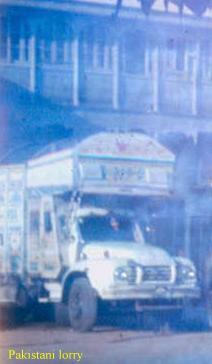 Yesterday, Keith and I spent refurbishing Orodruin. The rearmost universal joint had gone completely; the
flange bolts were very hard to remove.
Mike and Paul (in the Transit) are thinking of a run by boat in the future; this has aroused some interest
among we four landlubbers. We would need a lot of training and experience before trying that one, though!
Rik and Brian have gone to Charsadda to remove Shadowfax and their gear, we are leaving ours there, pending
a meeting arranged with Hanieff for Tuesday morning in 'Pindi.
Yesterday, Keith and I spent refurbishing Orodruin. The rearmost universal joint had gone completely; the
flange bolts were very hard to remove.
Mike and Paul (in the Transit) are thinking of a run by boat in the future; this has aroused some interest
among we four landlubbers. We would need a lot of training and experience before trying that one, though!
Rik and Brian have gone to Charsadda to remove Shadowfax and their gear, we are leaving ours there, pending
a meeting arranged with Hanieff for Tuesday morning in 'Pindi.
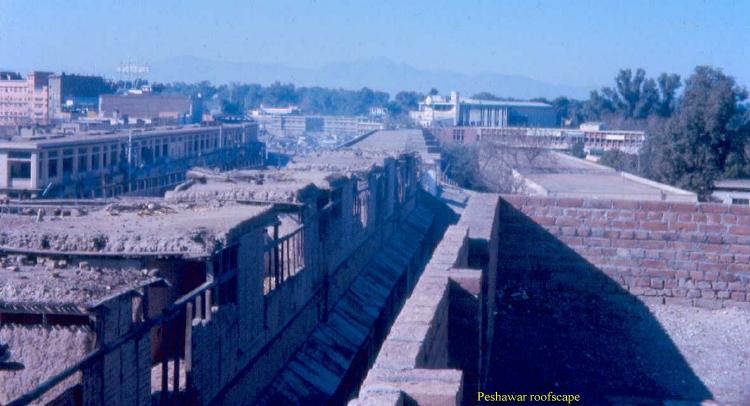
To the Collector, Central Excise and Land Customs; Peshawar, I have the honour to request of you, I am the holder of Passport No ------, issued in London. I entered Pakistan via Torkham on the 10th October 1974, with my car, No 237 FPO (Land Rover, Series IIa, made in 1962).This letter has been re-drafted and handed to Sikandar for typing. As we were leaving the Customs office, the officer quietly asked me if the car was very badly damaged.
It is necessary that I reach Australia before the 1st January 1975, in order that I may take up my employment there. If I do not take up employment by that time, I shall be unable to qualify for a Work Permit, and hence will be disqualified for employment.
On the 22nd October, while travelling towards Charsadda, the car burst a tyre, which caused me to lose control and leave the road. In the accident, the front axle case was damaged, upsetting the steering gear. Attempts to repair this have so far been unsuccessful.
A mechanic's Damage Certificate is attached for your information.
Permission may please be accorded to hand over this car to my friend Sikandar ----- ; so that he can repair the car, to enable me to take up my duties in Australia, without failing. No Objection Certificate may please be issued to me.
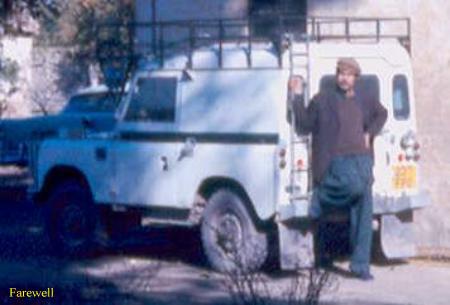 This is nothing but an open, unfenced compound, with no visible security.
This is nothing but an open, unfenced compound, with no visible security. |
Copyright © 1974 - 2004 David R. Brooks |  |
 Back to Home Page Back to Home Page
|
|
|